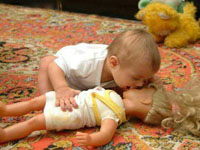Scientists Focus On Chemicals Linked with Deviation in Boys' Behaviour
Scientists are studying the chemicals which may seriously influence male behaviour and make boys more girlish rather than boyish.

Preschool boys exposed in utero to high levels of certain chemicals called phthalates (prounounced "thal-lates") may be less likely to play with male-typical toys and games, such as trucks and play fighting, according to a small pilot study published in the International Journal of Andrology. Girls' play behavior was not associated with phthalate levels in their mothers.
The two phthalates that were linked to boys' play behavior, diethylhexyl phthalate (DEHP) and dibutyl phthalate (DBP), are the phthalates of most concern to scientists because they have been shown to lower testosterone in humans and animals.
Because testosterone produces the masculine brain, researchers are concerned that fetal exposure to anti-androgens such as phthalates has the potential to alter masculine brain development.
Phthalates are chemicals used to soften plastics. They're primarily used in polyvinyl chloride (PVC) and found in vinyl and plastic tubing and personal care products such as soaps and lotions. But studies have shown a major source of human exposure to DEHP and DBP is through food and the way it's processed, packaged, stored or heated.
A federal law passed in 2008 banned six phthalates from use in toys such as teethers, play bath items, soft books, dolls and plastic figures. Research increasingly associates them with genital defects, metabolic abnormalities and reduced testosterone in babies and adults.
In the study of 145 preschoolers, the mothers' urine was previously collected and analyzed for phthalate metabolites around the 28th week of pregnancy by the Centers for Disease Control and Prevention (CDC). Play behavior was measured using the Pre-School Activities Inventory (PSAI), which is designed to measure differences in play behavior within and between the sexes.
The PSAI addressed three aspects of play: types of toys children choose (trucks versus dolls), activities (rough-and-tumble play, for example), and child characteristics.
The researchers controlled for a number of variables, including parental age, education and their attitudes towards children's play.
"In particular, we asked whether the mother would discourage a boy from playing with "girl-typical" toys (and conversely)," Swan said. "It is possible, however, that other uncontrolled factors could influence how the mother completed the questionnaire, but these are unlikely to be related to the mother's phthalate exposure."
Earlier studies have shown that phthalate exposure during pregnancy might affect the development of genitals of both male rodents and baby boys. Scientists refer to this cluster of genital alterations as the "phthalate syndrome," and research suggests that in rodent pups, the syndrome can have adverse consequences for later sexual development.
If endocrine disrupters such as phthalates can impair genital development and hormone levels in the body, the play-behavior study noted, then a deeper examination of how these chemicals impact the brain is warranted, the researchers said.
Chicago Tribune has contributed to the report.
Subscribe to Pravda.Ru Telegram channel, Facebook, RSS!


